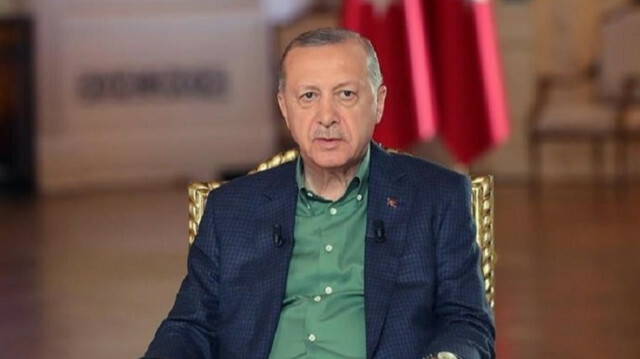
187 wildfires erupted in Turkey, 15 yet to be put out, says Recep Tayyip Erdogan
Forest fires are a global threat just like the COVID-19 pandemic, Turkey’s president said Wednesday.
The whole world is currently facing this challenge, which is like a “terrorist threat,” Recep Tayyip Erdogan said in a live television interview.
He said 187 forest fires have erupted in Turkey in the past eight days, with 15 of them yet to be put out.
Some 51 helicopters and 20 planes are engaged in operations to douse the wildfires, the president said.
He added that Turkish intelligence and police personnel are thoroughly investigating the fires.
Erdogan said Azerbaijani President Ilham Aliyev told him that his country will send another amphibious aircraft, which is currently undergoing maintenance, to Turkey to support its ongoing battle against the forest fires in its southern provinces.
Turkey’s Foreign Minister Mevlut Cavusoglu said Wednesday that Azerbaijan will send a new team to help Turkey in its firefighting efforts.
A total of 160 personnel, 40 fire trucks and a plane will arrive from Azerbaijan early Thursday, Cavusoglu said.
This will be the third team Baku has sent to assist Turkey’s fight against the wildfires.
According to official figures, at least eight people have lost their lives since the fires started in south and southwestern Turkey last Wednesday.
Turning to the global coronavirus pandemic, Erdogan said Turkey aims to get emergency use authorization for its indigenous Turkovac COVID-19 vaccine as soon as possible for its widespread use in the country.
"Phase 1 and Phase 2 of our domestic vaccine Turkovac have been successfully completed," he said, adding the clinical and research phase started in June.
He also said that the Turkish economy will see 7% growth this year and inflation and interest rates will drop in the coming period.
Turkey has administered more than 74.33 million doses of COVID-19 vaccines since it launched a mass vaccination campaign in January, according to figures released Wednesday.
The country is continuing its intensive vaccination campaign to curb the spread of the coronavirus, with everyone 18 and over eligible for vaccine shots.
Amid a nationwide drop in cases and an expedited vaccination drive, Turkey entered a new normalization phase on July 1, lifting almost all virus-related restrictions.
However, seeking to limit the spread of the Delta variant of the virus, the country suspended flights from India and required arrivals from the UK, Iran, Egypt and Singapore to have negative COVID-19 test results taken within 72 hours prior.
Since December 2019, the pandemic has claimed nearly 4.25 million lives in 192 countries and regions, with more than 200 million cases reported, according to US-based Johns Hopkins University.
On the Cyprus issue, Erdogan said Turkey is considering an international meeting to discuss issues regarding the region in the fall. The scope of the meeting will be about the Eastern Mediterranean, Cyprus and mainly the town of Maras, also known as Varosha.
Cyprus has been mired in a decades-long dispute between Greek and Turkish Cypriots, despite a series of diplomatic efforts by the UN to achieve a comprehensive settlement.
Ethnic attacks starting in the early 1960s forced Turkish Cypriots to withdraw into enclaves for their safety.
In 1974, a Greek Cypriot coup aimed at Greece's annexation led to Turkey's military intervention as a guarantor power to protect Turkish Cypriots from persecution and violence. As a result, the Turkish Republic of Northern Cyprus (TRNC) was founded in 1983.
It has seen an on-and-off peace process in recent years, including a failed 2017 initiative in Switzerland under the auspices of guarantor countries Turkey, Greece and the UK.
The Greek Cypriot administration entered the European Union in 2004, the same year Greek Cypriots thwarted a UN plan to end the longstanding dispute.

